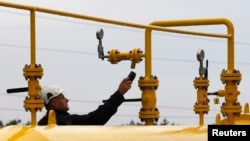Poland resumed natural gas deliveries to Ukraine on Friday after receiving a pledge that Russia's Gazprom would deliver requested supplies to Polish state-run gas importer PGNiG.
Poland, at odds with Russia over the stand-off in Ukraine, stopped so-called reverse flows to Ukraine after PGNiG said it had received less gas than ordered this week from Gazprom, which meets about a third of the European Union's gas demand.
“We confirm that the Polish side has resumed gas supplies to Ukraine, the volume will be known tomorrow,” a spokesman for the Ukrtransgas monopoly said.
Poland did not release updates on Friday on how much gas it was receiving from Gazprom, but Gaz-System, the Polish pipeline operator, said the current situation in the transmission system allowed it to resume reverse flows to Ukraine.
While Gazprom said it had been pumping the same amount to Poland as the previous week, the dispute underlined the tensions between the two countries over Moscow's intervention in Ukraine and fears Russia could turn off the spigots come winter.
Russian gas flows to Poland have fallen this month, with Reuters data showing a 12 percent drop.
Supplies this summer have also been lower than last year, although they are significantly higher than two years ago. Utility traders said the recent drop-off has been within the contractual norms.
“There may be some Russian maintenance work going on, or the Russians are injecting gas into their own storage in preparation for winter. Or perhaps they are sending a warning signal to Europe, because such a drop in the peak winter heating season will have a severe effect on the system despite being within the rules of their contracts,” one utility trader said.
PGNiG said on Thursday it had received 45 percent less natural gas on Wednesday than it requested from Gazprom. It releases information about gas volumes with a one-day lag.
Later in the day, Poland's economy minister said Gazprom had promised to deliver requested gas supplies to the gas importer, which did not say how much gas it had actually requested.
Russia has halted gas flows to Ukraine three times in the past decade - in 2006, 2009 and since June this year - because of price disputes with Kyiv, although this year gas intended for EU customers has so far continued to flow via Ukraine.
Analysts have not seen the situation this week as the start of a “gas war” but rather a potential warning to Europe that Russia would retaliate should Brussels impose new sanctions on Moscow over its intervention in Ukraine.
In Slovakia - the main entry point for Russian supplies to the European Union - gas importer SPP said it was seeing about a 10 percent reduction in deliveries on Friday.
The country, which opened a pipeline in September able to deliver natural gas from the EU to Ukraine, also reassured Kyiv it would not disrupt the reverse flows.
Opening up gas flows eastward was part of the EU's response to Gazprom's decision to cut supplies to Kyiv in a row over pricing and in the wake of Moscow's annexation of Crimea. Poland and Hungary can also send gas to Ukraine but the Slovak link boasts the biggest capacity of the three.
“This involves concrete agreements among companies,” Slovak Foreign Minister Miroslav Lajcak said in comments on Slovak news website hnonline.sk.
“The government does not have the opportunity nor any interest to get involved in this.”
Russian gas deliveries to Austria were down as much as 15 percent on Friday but within a range of fluctuation normal for the season, Austrian oil and gas company OMV said.
Hungary's pipeline operator said flows from Ukraine on Friday were running in line with its contract with Gazprom.













